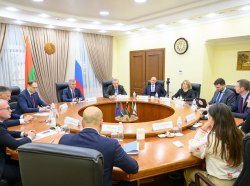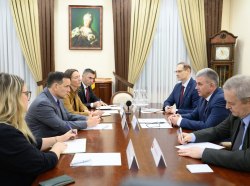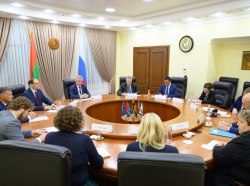Tiraspol, 11 January. /Novosti Pridnestrovya/. The head of state held a meeting to prepare for the participation of the Pridnestrovian delegation in a meeting of one of the working bodies of the Parliamentary Assembly of the Council of Europe (PACE). Invitations to take part in the work of the PACE Special Subcommittee on Conflicts have been sent to the chairperson of the Supreme Council, Alexander Scherba, and the minister of foreign affairs of the PMR, Vitaly Ignatyev.
The concept of the upcoming visit was discussed with the president. The head of state wished the delegates fruitful joint work. The theme of the PACE meeting scheduled for 16 January in Paris is the situation in the negotiation process on the Moldo-Pridnestrovian settlement. The discussion is expected to last the whole day. It will be held behind closed doors. Representatives of the conflicting parties — Pridnestrovie and Moldova, as well as the European External Action Service and Austria, which presided over the OSCE last year, have been invited to participate in the discussion, the president's press service reports.
Vadim Krasnoselsky underscored the significance oа promoting Pridnestrovie's position at all possible venues, recalling that last year was quite productive in this respect: Pridnestrovian representatives were given floor in London, Moscow, Tel Aviv, Rome, Sukhum, Geneva, Brussels and Vienna. Opening the foreign policy season on such a significant platform as the PACE suggests the relevance of the Moldo-Pridnesrovian settlement and confirms that the efforts of the Pridnestrovian side to intensify it bring real fruits.
"The invitation is the results of all the activities carried out last year by Pridnestrovie in the framework of the negotiation process. A significant number of appeals was sent out since the start of the year to all '5+2' format participants, as well as foreign ministers of the EU countries. There were serious issues with the position of the Austrian chairmanship: it was, in fact, inertial. '5+2' meeting had not been held for a long time, which caused a certain pause in our work. Pridnestrocvie's active position gave an impetus to the negotiation process. Th initiative to open the bridge contributed to these active measures. It led to the signing of a number of agreements which were eventually enshrined in the Vienna Protocol of the 'Permanent Conference...' meeting," underscored Vitaly Ignatyev.
The foreign minister said that he did not only expect to voice Pridnestrovie's position bust also to take an active part in a lively discussion, to exchange views and, perhaps, to come to a common understanding of the problem and ways out of the current situation.
Parliament speaker Alexander Scherba also stressed the importance of the upcoming visit. "Discussion is the most important thing. We are ready to answer any questions asked by Moldovan representatives. As arguments, we have legal instruments supporting the position of the Pridnestrovian Moldavian Republic; there are legislative analogues. We have nothing that goes beyond the limits established by the international community. So, I'm sure: if Europe is ready to heed us, we'll be heeded."
The speaker briefed the president on the preparatory work that was being conducted in the parliament. The Supreme Council's praesidium had approved the concept of the future report. Scherba's report will start with the historical introduction. Then he will proceed to the current situation with an emphasis on the mandatory observance of human and civil rights and freedoms regardless of the place and status of the territory of his residence.
The interlocutors discussed the content of both reports, breaking them into thematic sections so that each speach would be as informative and interesting for the audience as possible. The president stressed that the main leitmotiv must be an interest in the Pridnestrovian land and its people who, seeking independence, have preserved peace, in the society that is developing, remaining faithful to the principles of freedom and equality, peace and good-neighbourly relations.
"The PACE is a serious international organisation. I want you to once again voice the principles of our independence. It is not time today that we discussed political dialogue today because neither Moldova nor Pridnestrovie is ready for this. Now it is necessary to speak about specific issues on whose solutions people's lives depend," noted Krasnoselsky. Appreciating last year's foreign policy results, the president stressed that the agreements that were reached had given impetus to the negotiation process, which should be intensified in the future.
The president expressed the hope that the upcoming meeting in Paris would open a series of events relevant to the solution of Moldo-Pridnestrovian problems. In this regard, Krasnoselsky called the heads of the parliament and the MFA for constructive cooperation aimed at solving the problem of state importance — the recognition of the Pridnestrovian Moldavian Republic.









